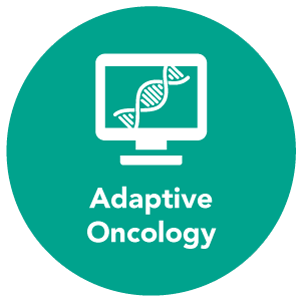A collaboration between OICR, University Health Network and the Marathon of Hope Cancer Centres Network can help inform the next evolution of cancer care in this country.
By studying the care trajectory of Canadian patients with biliary tract cancers, a group of OICR researchers and collaborators have shown how precision oncology has the potential to transform cancer care, while also highlighting the challenges patients face to accessing it.
Their study, published recently in Current Oncology, followed 55 patients from across Canada who had their biliary tract tumours tested using whole-genome and transcriptome sequencing (WGTS) and had results analyzed by an expert panel called a ‘molecular tumour board’.
WGTS is a powerful test that can reveal tiny variations in tumour cells that contribute to cancer growing and spreading. In many cases, these variations can be targeted by a specific medicine that gives the patient the best chance against cancer.
Tailoring treatment to each tumour’s unique biology is referred to as ‘precision oncology’, and it’s often considered the next evolution of cancer care. But not all tumour variations can be targeted with an existing medicine, and access to ‘targeted therapies’ is inconsistent across health systems.
Of the 55 patients followed in this study, 43 were identified as candidates for a targeted therapy. The authors say this is a promising result, showing that a large proportion of biliary tract cancer patients are ready to benefit from precision oncology.

“Our study shows not only that sequencing-informed precision medicine is feasible in Canadian hospitals, but that, at least for biliary tract cancer, the potential clinical impact is important,” says Dr. Felix Beaudry, Scientific Associate at OICR, Postdoctoral Research Fellow at the Princess Margaret Cancer Centre (University Health Network), and the study’s first author.
Despite this potential, Beaudry and colleagues found that multiple challenges remain to implementing precision oncology across Canada’s health systems. Only eight of the 55 patients followed by the study ultimately received a targeted therapy. This was in part because of the time required for WGTS testing and analysis — it can take several weeks to test, analyze and deliver clinically relevant results, and patients with fast-moving cancers simply can’t wait that long to start their first-line treatment.
The other major challenge was around access. None of the targeted therapies received by patients in the study were covered by public health insurance in Canada, with most being funded privately or available only through compassionate access programs. Many targeted therapies are new and have not yet been approved for public reimbursement, highlighting the need for policy changes to make these potentially life-saving medicines more widely accessible.

“While our work highlights the immense potential for targeted therapies in biliary tract cancers and in the fight against cancer more generally, it also demonstrates a need for new approaches so that all Canadians can access these treatments,” says Dr. Robert Grant, a Medical Oncologist at Princess Margaret, Co-Lead of the PanCuRx program at OICR, and the study’s senior author.
Another key takeaway from the study was the value of molecular tumour boards. These multidisciplinary groups meet to analyze the results of genomic testing and can help make complex decisions about a patient’s eligibility for targeted therapy more effectively than automated systems. In this study, a molecular tumour board recommended 43 patients in the study for targeted therapy, while an automated analysis identified only 28.
“About one in four cases would not have had precision therapy recommendations if it weren’t for the discovery focus of the tumour board,” Beaudry says.
This study resulted from an ongoing collaboration between OICR’s PanCuRx program and the The LeGresley Biliary Registry at University Health Network funded by the Legresley Family Foundation through the Princess Margaret Cancer Foundation and the Marathon of Hope Cancer Center Network. Samples were processed through OICR’s Tissue Portal and Genomics lab.
With world-leading expertise in pancreatic and biliary cancers and a Genomics program that is making WGTS and analysis more efficient, Beaudry says OICR is uniquely positioned to help realize the potential highlighted in this paper.
“The insight we gained from this study will place OICR in an important position for the next decade in precision medicine,” Beaudry says.




